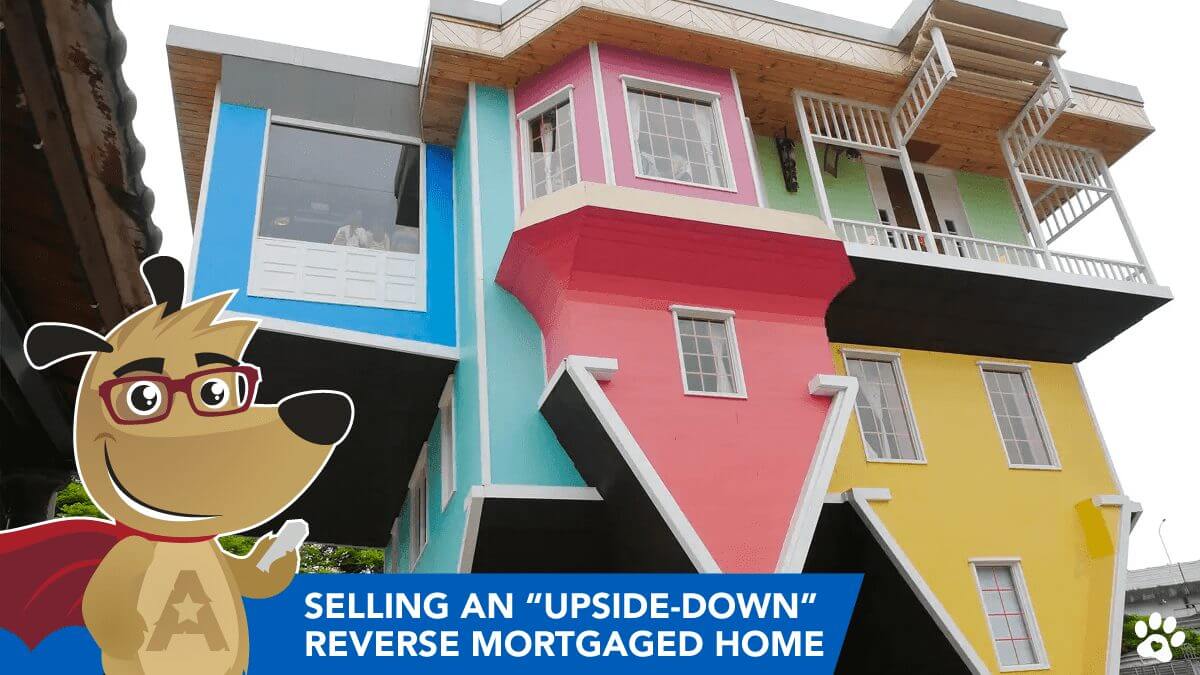
America’s #1 Rated Reverse Lender*
Selling an “Upside-Down” Reverse Mortgaged Home
 |
Michael G. Branson, CEO of All Reverse Mortgage, Inc., and moderator of ARLO™, has 45 years of experience in the mortgage banking industry. He has devoted the past 20 years to reverse mortgages exclusively. (License: NMLS# 14040) |
 |
All Reverse Mortgage's editing process includes rigorous fact-checking led by industry experts to ensure all content is accurate and current. This article has been reviewed, edited, and fact-checked by Cliff Auerswald, President and co-creator of ARLO™. (License: NMLS# 14041) |
I am still confused about debt after I sell. My wife and I have a current reverse mortgage debt of $300K on a Seattle (98146) house valued by Zillow at $310K. At time of reverse mortgage award it was appraised at $380K. We took out the reverse mortgage about 15 years ago thinking it would be our home until death.
Unfortunately, for health reasons, we can no longer live in the Seattle weather; I am 88 yrs. old (VA 100% permanent and totally disabled) and she is 82 years old. Our plan is to establish permanent residence in a house we own in Florida (33774) which is valued at $310K and a conventional $195K mortgage. This would greatly relieve our health problems.
If we have an offer from a buyer for the Seattle house of say $300K that would not be enough to pay realtor and selling costs; generally speaking we may be 10% ($30K) short from the sale. Do we have to come up with $30K from pocket to sell the house?
If we walk away from the house are we liable for the deficiency? We have had a virtual perfect credit rating for all our lives. Will this affect our chances for getting a reverse mortgage on the Florida house if we so choose? Our income is $80K/yr so that is not a problem. Any recommendations? Thanks…Tom

Hi Thomas,
The reverse mortgage is a “non-recourse debt” which means that no matter how you choose to sell the home, whether there is a shortfall in the payoff amount or not, the lender can never look to any other asset for payment of the debt.
They can only get their repayment from the home. This means that whether you walk from the home which results in a loss to the lender or sell the home and there is a shortfall, the lender cannot seek additional funds from you other than what they get from the sale of the home.
We really recommend that you contact your servicer and let them know that you must relocate and tell them the plans and your anticipated timeframe. They can usually tell you exactly what options are available.
It’s also best to talk to a knowledgeable real estate professional to determine the most probable price the home will bring and compare that to your current statement to determine what your position most likely will be. Are house prices increasing, decreasing or remaining stable? This might also influence your decision and your timing.
Now there is the question of credit. Most servicers do not even report reverse mortgage accounts to credit because there are no payments, but I cannot speak for your lender.
You may want to talk to them in advance to see what they will or will not report to credit. Also, a foreclosure action is a public record, not just a matter of a lender reporting.
Therefore, if you walk from the property and allow the lender to foreclose, even if the lender does not report a foreclosure to credit, the public records may still show the action.
Here again, you may want to work with the lender to sell the home if you are able since a short sale is not a public record (but there again, check with the lender to see what they will or will not report to credit).
Finally, about your last question about future reverse mortgages, HUD will not allow a borrower to get another reverse mortgage as long as there is a loss outstanding on a prior account.
In other words, if you had one reverse mortgage that resulted in a paid in full account, you can always get another reverse mortgage later.
However, if you have a deficiency balance on a previous reverse mortgage, you cannot obtain an additional reverse mortgage for as long as the deficiency balance remains outstanding.
Every lender is required to do a check on all potential borrowers in advance and borrowers showing a loss to the HUD fund will not clear so long as that loss is still outstanding and therefore the lender is not supposed to be able to get a case number to begin processing a reverse mortgage loan for borrowers who show an active loss to the insurance fund.
ARLO recommends these helpful resources:

 Michael G. Branson
Michael G. Branson Cliff Auerswald
Cliff Auerswald

July 19th, 2022
July 19th, 2022
December 31st, 2021
January 11th, 2022
November 17th, 2021
November 17th, 2021
May 28th, 2020
June 2nd, 2020
May 21st, 2020
May 21st, 2020
January 2nd, 2020
January 2nd, 2020
May 15th, 2017
May 15th, 2017